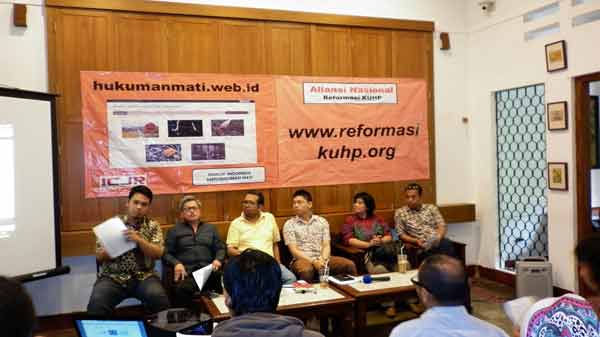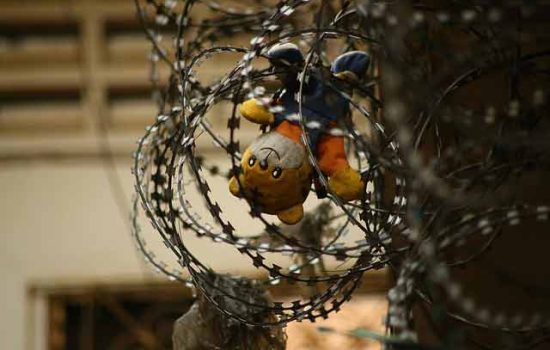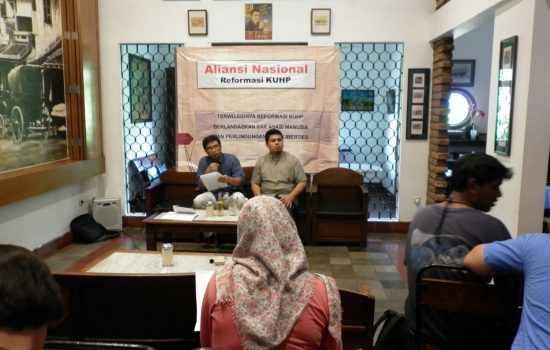Commemorating the World Day Against Death Penalty every 10 October, the National Alliance for Criminal Code Reform (Aliansi Nasional Reformasi KUHP) along with Anti Death Penalty Coalition (Koalisi Anti Hukuman Mati), urge President Joko Widodo to abolish death penalty in the Indonesian criminal justice system. Many countries in the world have also left one of the most uncivilized punishment in the history of mankind. Indonesia is one of many states that still implementing death penalty.
Up until this day, the Joko Widodo administration has executed 14 death convicts, all of them are involved in narcotics cases. The first phase of execution was organized on Sunday, 18 January 2015, towards six death convicts—most them are foreign citizens. They are Marco Archer Cardoso Moreira (Brazilian), Namaona Denis (Malawian), Daniel Enemuo a.k.a Diarrassouba Mamadou (Nigerian), Ang Kiem Soei a.k.a Kim Ho a.k.a Ance Tahir a.k.a Tommi Wijaya (Dutch), Tran Thi Bich Hanh (VIetnamese), and Rani Andriani a.k.a Melisa Aprilia (Indonesian).
The second phase of execution was organized on Wednesday midnight, 29 April 2015. During this phase, eight death convicts were executed, namely Myuran Sukumaran (Australian), Andrew Chan (Australian), Martin Anderson (Ghanaian), Zainal Abidin bin Mgs Mahmud Badarudin (Indonesian), Raheem Agbaje Salami (Spaniard), Rodrigo Gularte (Brazilian), Sylvester Obiekwe Nwolise (Nigerian), and Okwudili Oyatanze (Nigerian).
After two phases of execution, which spent nearly IDR 3 billion in costs, the Attorney General has already planned the third phase execution, by submitting a budget to the State Budget. After gathering many information, it is revealed that 121 individuals in the death row, while at the same time the prosecution and conviction on death penalty are also increasing. The Joko Widodo administration’s assertive stance is warmly received by the prosecutors and judge.
During July until October 2015, there are at least 13 cases prosecuted with death penalty. These cases are in regards to narcotics and premeditated murder (2 cases were prosecuted at Baturaja District Court; one case in each of the following district courts: Tanjung Selor District Court, Kayuagung District Court, Lhoksukon District Court, Cibadak District Court, Pekanbaru District Court, Banda Aceh District Court, Tangerang District Court, Karawang District Court, Surabaya District Court, and Central Jakarta District Court).
In regards to court decision, it is noteworthy that the Supreme Court convicted 13 individuals by disregarding one of the most important principles, which is the Supreme Court is not judex factie (trier of facts) but merely judex juris (trier of law). By increasing the sentence, the Supreme Court is no longer a cassation proceeding, but another form of court of appeal.
The trend in death sentence during August until October 2015 shows 15 cases in all instances of court, starting at the first instance (district courts) up to the Supreme Court (12 death sentences at the Supreme Court; 2 at Surabaya District Court; and 1 at Purwakarta District Court). This figure increased from the three months period before the first phase execution (October-December 2014), which only recorded 5 death sentences (2 death sentences at the Supreme Court; 2 at Batam District Court; and 1 at Tangerang District Court).
In terms of constitutional issue, there are several cases currently undergoing trial at the Constitutional Court. Two judicial reviews are recorded related to death penalty, which is the review on the limitation of criminal case review (peninjauan kembali) under the Supreme Court Law and Judicial Power Law, including the presidential pardon provisions under the Clemency Law.
With all the surrounding controversies in regards to death penalty, Indonesia is still struggling with fair trial problems, international pressure, and the protection of Indonesian citizens that are charged with death penalty abroad. The Indonesian government, on the other hand, is organizing two phases of death execution in the first year of the Joko Widodo administration—with the upcoming third phase in 2016. Due to the problems regarding death penalty cases, the commemoration of the World Day Against Death Penalty every 10 October is the right moment to reconsider the relevance of death penalty in Indonesia.
Death Penalty in Indonesia:
1. Death Penalty with Poor Fair Trial
Not long after the Permanent Mission of the Republic of Indonesia to the United Nations made a statement at the “High-Level Panel Discussion on the Question of the Death Penalty: Regional Efforts Aiming at the Abolition of the Death Penalty and Challenges Faced in that Regard”, during the 28th United Nations Human Rights Council Meeting, on 4 March 2015, at United Nations Headquarter, Geneva, by saying that fair trial has been implemented to all death convicts, Indonesia was getting a “slap-in-the-face” moment when it was discovered that a minor named Yusman Telambanua was convicted with a death sentence. Yusman and his brother-in-law Rasulah Hia were convicted with death sentence, and also tortured by the investigator who forced these minors to admit crimes that were not committed by them. They were not getting proper legal aid and legal counsel, and to make thing worse their own attorney asked the court to convict them with death sentence
Yusman is not the only case here. Mary Jane Veloso, a victim of human trafficking, was almost executed during the second phase of death execution. Fortunately, the human trafficking perpetrator surrendered to the Philippines law enforcement officials. Eventhough Mary Jane insisted that she is a victim of human trafficking during trials at district court up to case review, the prosecutors and judges were disregarding this fact. Different situation is experienced by Zainal Abidin, who submitted a case review petition, but it was not processed in 10 years after the submission. Zainal even transferred to the isolation room, even though the case review decision is not rendered yet.
In general, the poor situation of fair trial in Indonesia is evident from many problems in death sentences, in which these problems happened in all levels and recurring, such as the lack of effective legal aid, weak proof of evidence from the prosecutor, excessive investigation, and inconsistency in court decisions.
2. Government’s Political Hyprocrisy
In regards to the Draft Bill on Criminal Code (RKUHP), the government has the intention to limit the use of death penalty. Article 89 of RKUHP states that death penalty can be imposed alternatively, as the last resort to protect the society. The limitation in using death penalty is further elaborated on under Article 90, which stipulates that a death penalty can be postponed for 10 years. If during this probation period the death convict shows a good attitude and manner, the death sentence can be converted into life sentence or 20 years of imprisonment (maximum). If the death convict fails to pass the probation, then the death penalty can be executed, after the pardon is rejected by the president. Article 92 of RKUHP further states that if the pardon request is rejected and the death penalty is not executed within a 10-year period—not because the death convict escapes—then the death sentence can be converted into a life sentence
While the abovementioned provisions is considered as a compromise, there are some inconsistencies under RKUHP. The fact that RKUHP stil incorporates death penalty contradicts the purpose of penalization stated under Article 55 (2) of RKHUP, which stipulates that penalization is not intended to degrade the human dignity. In addition, Chapter II of RKUHP still imposes death penalty towards crimes that are not in line with the International Covenant on Civil and Political Rights (ICCPR), such as treason, corruption in certain time, crimes committed on board aircraft, and many other criminal offences. This situation shows that RKUHP is not properly harmonized with international law that has been ratified by Indonesia.
The hypocrisy shown by the government, with the intention to limit the use of death penalty, while at the same time still organizing death execution, indicates that the Joko Widodo administration has no stance on death penalty. Not only the government, other independent institutions focusing on human rights, such as the National Commission on Human Rights (Komnas HAM), National Commission on Violence against Women (Komnas Perempuan), and the Indonesian Child Protection Commission (KPAI) are divided, in which KPAI supports death penalty. This situation signifies the vulnerability of the concept of law and human rights in Indonesia.
3. Indonesian Migrant Workers Are Sentenced to Death, Indonesia Keeps Executing?
The indecisiveness of government in regards to death penalty is evident when Indonesia asked pardon to other heads of state for Indonesian citizens that were sentenced to death. The record shows that Indonesian migrant workers facing death penalty are 228 individuals, spreading in many countries: 36 in Saudi Arabia, 168 in Malaysia, 16 in People’s Republic of China, 4 in Singapore, 2 in Lao, 1 in United Arab Emirates, and 1 in Vietnam. Indonesia’s practice that insists in executing death convicts, is not in line with its request to ask pardon for its own citizens. The lack of Indonesia’s capability in protecting its own citizen is weakenedby continuously executing death convicts in its own jurisdiction. This is a form of arrogancy and shows no emphaty to Indonesian citizens facing death sentences in foreign countries.
4. Deterrent Effect and War on Narcotics
The deterrent effect, which is the main argument why death penalty is still being used, is never proven in Indonesia or in other countries. The United Nations has confirmed that there is no scientific evidence that death penalty may reduce the number of crimes. Regarding narcotics cases, for example, public health researchers have said in The Lancet journal that Indonesia’s war on narcotics is misdirected, as it prioritizes criminalization and punishment, instead of public health approach such as rehabilitation. This argument is reasonable, as Indonesia firstly imposed death penalty for narcotics crime in 1995 towards Chan Tian Chong, and at least 21 perpetrators have been executed since 2004, however there is no significant decrease in narcotics user. The National Narcotics Agency (BNN) recorded that in 2008, there were 3.3 million narcotics users, and 5.1 million in 2015.
5. Unfair Law
Administrative problem and more attention to formal aspect instead of the material truth are evident from the regulations issued by the Supreme Court. The Constitutional Court Decision No. 34/PUU-XI/2013 asserts that the main objective of a criminal justice is the material truth, and therefore administrative and formal reasons may be ruled out. The Supreme Court responded to this by issuing Circular Letter No. 7 of 2014, which limits the submission of case review (peninjauan kembali) by the justice seeker, with the argument of administrative issue and expediting death execution. The Constitutional Court views that this circular letter is a form of non-compliance to the Constitutional Court Decision. In fact, the Constitutional Court even argues that the circular letter violates the Constitution. The circular letter and other regulations that hamper the justice seekers are serious problems that need to be resolved.
Up until today, the judicial review petition on the Circular Letter No. 7 of 2014, submitted by the Institute for Criminal Justice Reform to the Supreme Court is yet to be concluded.
6. Clemency: Does the President Read It?
The President’s authority to grant pardon is stipulated under Article 14 (1) of the 1945 Constitution. Further provisions are detailed out under the Clemency Law. There are, however, several fundamental problems under the Clemency Law. For instance, the Clemency Law does not stipulate any provision that obliges the President to thoroughly consider every pardon request on his table and to give proper explanation in accepting or rejecting pardon requests.
The lack of such provision creates a possibility for the President to abuse his power. The President may accept or reject a pardon request without any thorough research and consideration, which is actually the society and applicant’s right. The President may use the pardon authority unwisely, and even contradicts its main objective.
For the applicant, pardon is a decision that will determine whether he/she will continue to live or not. It is known that the President fails to give proper consideration when rejecting or accepting a pardon, while there should be a study or research to determine on whether or not a person must be punished. This loose provision may lure the President to give a clemency without a clear argumentation.
Due to the abovementioned situation, the National Alliance for Criminal Code Reform (Aliansi Nasional Reformasi KUHP) along with Anti Death Penalty Coalition (Koalisi Anti Hukuman Mati) urge President Joko Widodo to:
- Review all court decisions with death sentences, and ensure that all decisions are in accordance with the fair trial principles and universal principles in imposing death penalty
- Review all laws and regulations to ensure the protection of human rights and justice seekers.
- Postpone death execution (moratorium) towards all death convicts, as currently there is no criminal procedural law that in line with fair trial standards. The Government must, at least, proceed with the discussion on RKUHP to establish new standards on criminal justice process towards suspects charged with death penalty
- The Supreme Court must revoke Circular Letter No. 1 of 2012 and No. 7 of 2014 that limits the justice seekers. Case review (peninjauan kembali) must be regulated comprehensively under Criminal Procedural Law or specific law on case review, so it will not limit the rights of death convicts.
- For narcotics issue, the government must review its punitive strategy that is not effective and counter productive as stated by scientists and experts, and recommend a proven intervention method such as opioid substitution, clean syringes, treatment to HIV and narcotics victims.
- For migrant workers issue, the government must undertake strategic actions and lever its bargaining position in protecting Indonesian citizens that charged with death penalty in foreign countries, abolishing the practice of death penalty may be a strong reason to strengthen Indonesia’s bargaining power in protecting its citizens.
Aliansi Nasional Reformasi KUHP dan Koalisi Indonesia Anti Hukuman Mati
ICJR, Elsam, PSHK, ICW, LeIP, AJI Indonesia, LBH Pers, Imparsial, KontraS, HuMA, Wahid Institute, LBH Jakarta, PSHK, ArusPelangi, HRWG, YLBHI, Demos, SEJUK, LBH APIK, LBH Masyarakat, KRHN, MAPPI FH UI, ILR, ILRC, ICEL, Desantara, WALHI, TURC, Jatam, YPHA, CDS, ECPAT, IKOHI, Migrant Care, Yayasan Satu Keadilan, PBHI




